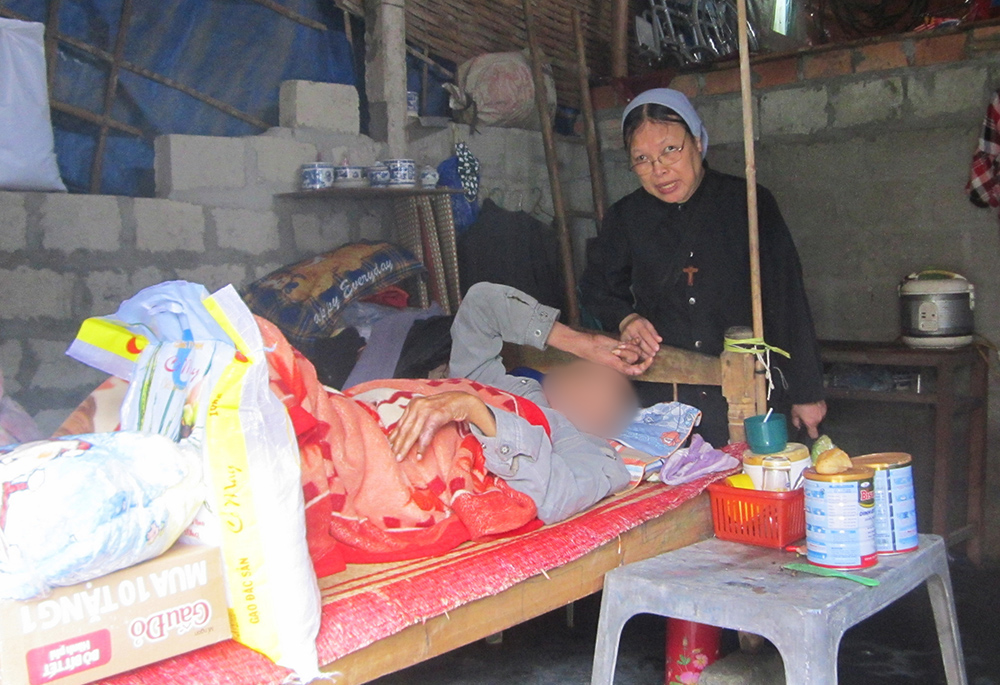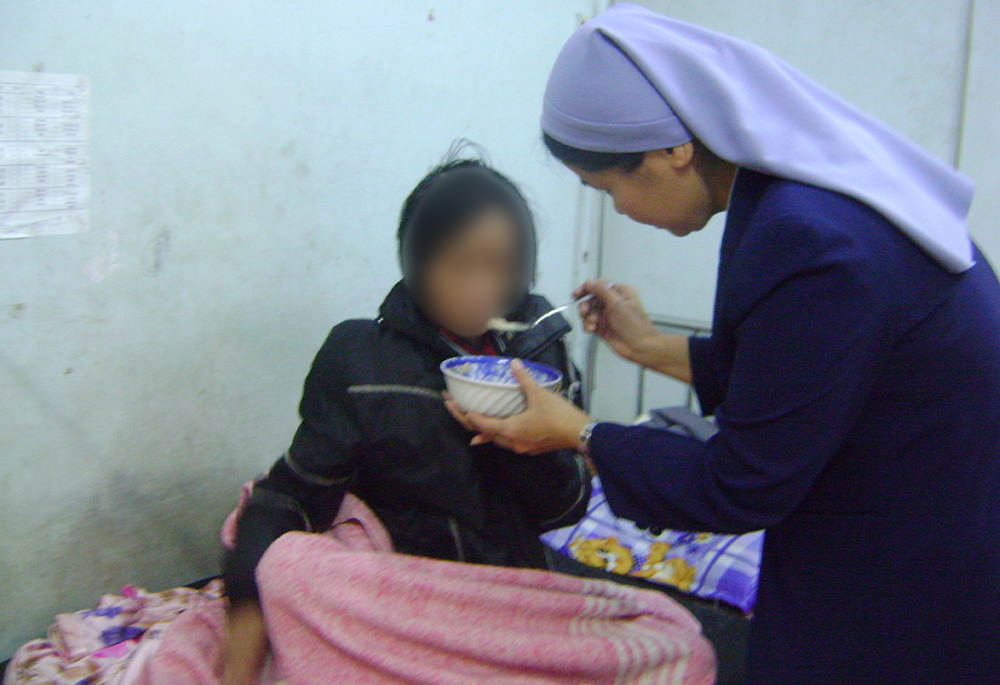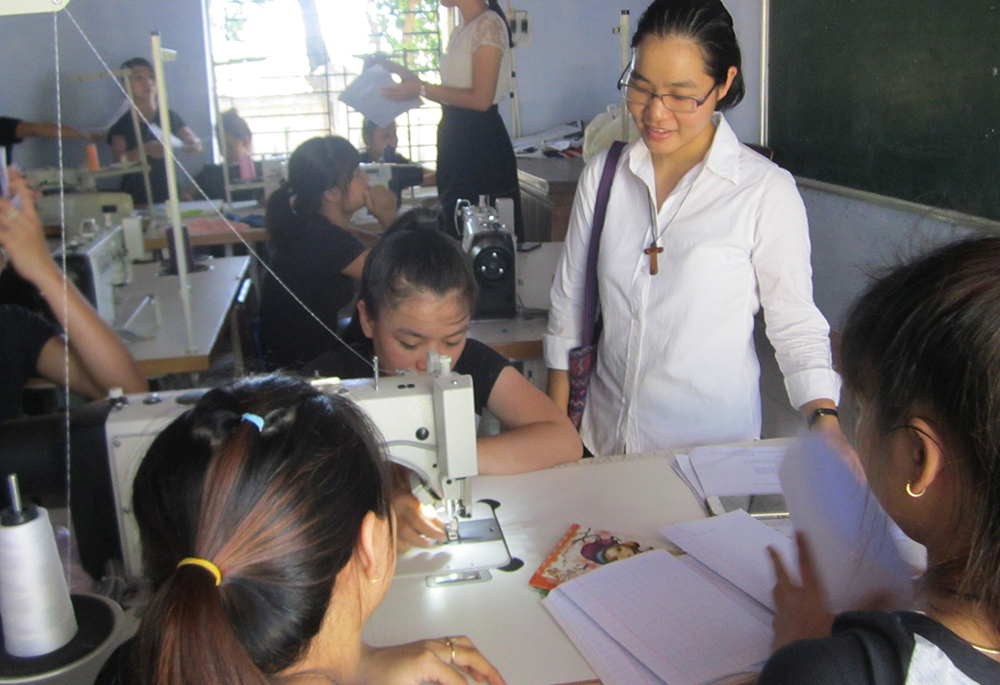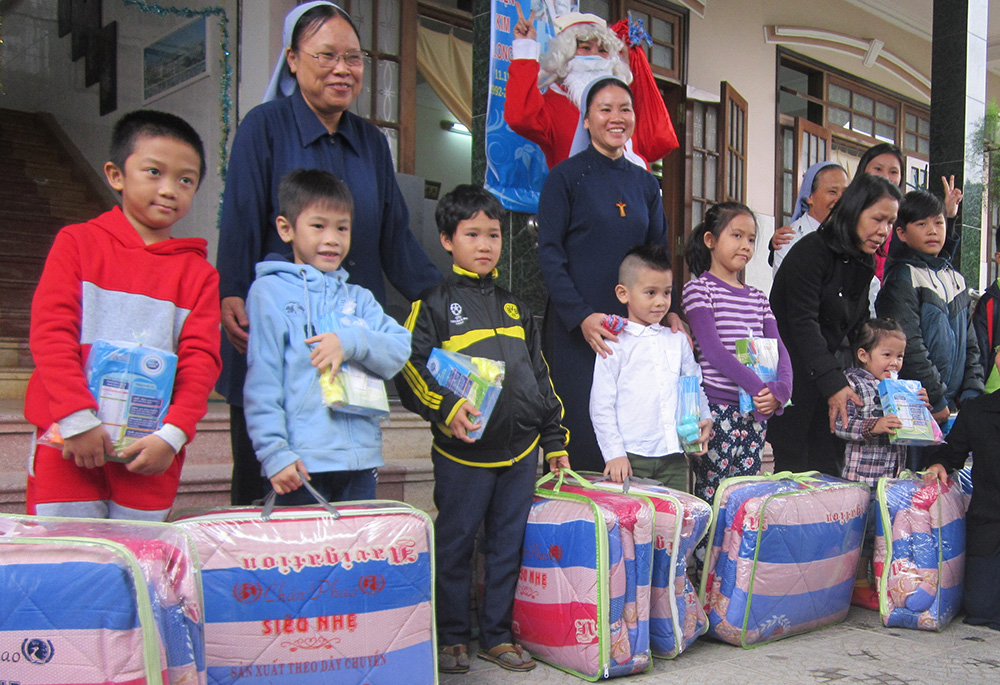
Filles de Marie Immaculée Sr. Lucia Nguyen Thi Ngo offers rice, instant noodles and milk to a patient (face obscured to protect identity) Nov. 12, 2022, in Vietnam's Phu Loc district. (GSR photo/Joachim Pham)
Three years ago, doctors at a public hospital in Quang Tri province refused to deliver the baby of Tran Thi Hong, a pregnant woman with AIDS.
Aware of her disease, the doctors pled that they didn't have enough blood for a transfusion in case she had to have a cesarean delivery, instead referring her to another public hospital in the neighboring province of Thua Thien Hue.
"We had no choice but to accept the referral," Hong said, adding that her husband had to carry her on his motorbike to Hue, 70 kilometers away. There, the couple appealed for help from Filles de Marie Immaculée (Daughters of Mary of the Immaculate) nuns in the capital of the province.
The nuns worked with Hue Central Hospital and used their ambulance to take her to the hospital, where she delivered a healthy boy.
"It was a harrowing experience of childbirth in my life, but it was lucky for me to be saved by the nuns' generous help," said the 29-year-old mother, who works as a dressmaker for a living.
"Now we are happily alive and in good health and build a harmonious relationship with our neighbors," she told GSR, adding that she and her husband also visit and offer food to other HIV/AIDS patients and people in need.
"What the nuns offered us in difficult times has been the gift that keeps on giving," Hong said.
Vietnam has an estimated 242,000 people with HIV and records 13,000-14,000 new cases each year, with detected cases increasing over the last few years. Many of them refuse to receive medical treatment at health care centers for fear of being mistreated and discriminated.

Filles de Marie Immaculée Sr. Agnes Truong Ngoc Lan feeds a seriously ill patient (face obscured to protect identity) Dec. 3, 2022, in Hue. (GSR photo/Joachim Pham)
Sr. Mary Nguyen Thi Hang, who is in charge of HIV/AIDS patients at the Kim Long Charity clinic run by Filles de Marie Immaculée sisters, is among four sisters and 30 volunteers (including Buddhists, Christians and Taoists) who work with some 200 patients.
The nun said people are often dismissive of patients with HIV/AIDS, assuming they're sex workers, drug abusers, and men who have sex with men; they are undervalued by other people, she said, often denied jobs as well.
She said she knew of seven people with HIV/AIDS who died of COVID-19 last year, as discrimination prevented them from accessing health care services.
Hang said a woman from Ha Tinh province was infected with HIV from her boyfriend, who eventually abandoned her after she gave birth to a son. Though she later married a man from Thua Thien Hue province and gave birth to a daughter, her mother-in-law asked her not to return home after learning she carried the disease. Her daughter died of diseases while her husband was working in Laos.
Now she works in the coastal city of Da Nang, and sometimes visits her son whom the nuns are raising.
Advertisement
To combat discrimination against people with HIV, Hang said they provide information on the virus for parents, youths and catechism students at local parishes. They give patients financial support to run small businesses and raise poultry and cattle for a living.
"Once they could support themselves and lead a good life, they will retain their dignity and earn the respect of other people," she said.
Anna Tran Thi Thanh, a mother who contracted HIV from her now-deceased husband, said she would not have overcome overt discrimination from others without the sisters' material and emotional support.
Thanh, 43, said Filles de Marie Immaculée Sr. Mary Benedictine Nguyen Thi Dien provided them free accommodation and five million dong (about $212) in 2005 to run a small business for a living. She traded plastic baskets, plates, bowls and cups at An Hoa market, but people kept away from her, and the market guards threw her goods away and drove her away.
Thanh found no way to continue to live in the city. She decided to return to her home parish of Pho Thach in Phong Dien district to steer clear of the widespread discrimination against her. Her emaciated body, however, sparked speculation about her condition throughout the parish.
"Churchgoers dared not sit in my row in the church, and I felt utterly desperate about my fate and decided not to go to church," she said.
Years later, some sisters from Hue Archdiocese's HIV/AIDS Prevention Committee invited Thanh to join the committee and spread her knowledge of the disease, as well as her personal experience with discrimination, in local parishes.

Filles de Marie Immaculée Sr. Mary Nguyen Thi Hang meets women who learn sewing skills in Hue. (GSR photo/Joachim Pham)
"The nuns called on them to give humane treatment to innocent patients and hugged me tightly many times in front of them as a way to show that HIV was not contagious," Thanh told GSR. "As a result, people changed their attitudes and expressed their sympathy for me."
"I put all my energies into preventing discrimination against people in HIV and the spread of the disease in communities," she continued. "As a result, it allows me to live with dignity today."
Thanh, who sells food to support her children, said her two children are not infected with the virus. After her work, she joins with the nuns to teach people about HIV/AIDS prevention at local parishes and visit people with mental disorders.
"I can now enjoy life to the fullest thanks to the nuns, so I am eternally grateful to their unwavering support," she said.
Filles de Marie Immaculée Sr. Lucia Nguyen Thi Ngo, who started to serve people with HIV/AIDS in 2008, recalled caring for Lucia Tran Thi Mai, an AIDS patient from Huong Thuy district. Mai's siblings put her in a tent near a river bank and daily used a stick to give her food.
Ngo visited and fed Mai weekly and washed her hair while persuading her relatives to house her.
"Three months later, she decided to embrace Catholicism before her death in 2019," Ngo said, noting that 27 patients have been baptized after they received care from the nuns and volunteers.

Filles de Marie Immaculée Srs. Lucia Nguyen Thi Ngo (left) and Clare Mai Tran Tu Uyen give blankets and milk to orphans and vulnerable children Dec. 21, 2022, in Hue. (GSR photo/Joachim Pham)
Ngo, who serves as a nurse, said she and the volunteers feed, bathe and wash clothes of terminally ill patients.
On the weekend, they also offer food and flowers to patients in Hue Central Hospital as a way to console them, since many patients have no relatives by them.
The nun said they also educate local people in HIV prevention, teach patients' relatives how to care for them, offer problem-solving skills to orphans and vulnerable children. Many patients are taught basic skills of sewing, embroidery, and making pictures with shells and seashells for a living.
"We and the patients really need one another," she said. "They receive our good care, comfort, and sympathy while we learn their challenges and joys to fuel up in our religious life."






